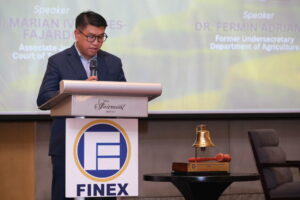Edmund Alan A. Qua Hiansen l 16 May 2025 at the Ballroom #2, Fairmont Makati

Honorable Justice Marian Ivy F. Reyes-Fajardo, Honorable Dr. Fermin Adriano, FINEX Past Presidents and Valued Guests,
Good afternoon, and welcome to our 5th General Membership Meeting on “The Anti-Agricultural Economic Sabotage Act: Fostering a Competitive Agricultural Sector.”
If my speech was enhanced by AI at last month’s GMM on Artificial intelligence, this month’s speech is enhanced by our delicious food.
Before I begin, I would like to thank FINEX’s year-round sponsors for supporting our activities: PHINMA Corporation, Romulo Law, BPI, SGV, PWC Philippines, KPMG, Asticom, and San Miguel Corporation.
Hippocrates stated, “Let food be thy medicine and let thy medicine be food,” highlighting the connection between food and health, emphasizing that food is not only essential for survival but also plays a crucial role in the well-being of individuals. In the 2024 Global Hunger Index, the Philippines ranked 67th out of 127 countries, which translates to moderate hunger. Of more significant concern are the numbers within the headline numbers: 26.7% of Filipino children are stunted, and 5.4% of our children are wasted. Stunted refers to children who are too short for their age while wasted refers to children who are too thin for their age. These result in weaker immune systems, delayed mental development, poor academic performance, and reduced intellectual capacity. The United Nations Sustainable Development Goal 2 on “Zero Hunger” explicitly addresses malnutrition through target 2.2, which aims to end all forms of malnutrition by 2030.
According to the Social Weather Station, in 2024, the annual average of Filipinos experiencing hunger reached 20.2%, while according to data from the BSP Consumer Finance Survey, food expenditures represent 23.8% of a typical Filipino household’s spending. By the way, hunger peaked at more than 30% during the pandemic.
Food security is essential, and our nation has been blessed with abundant natural resources, which should theoretically result in food security. At the heart of this lies our agriculture sector, a sector with aging workers that is often at the mercy of the adverse effects of climate change.
Agriculture is the primary source of food that nourishes our communities. Agriculture sustains us from the rice we eat daily to the vegetables, fruits, and fish that complement our meals.
But beyond food security, agriculture is also a major source of livelihood for millions of Filipinos, especially in rural areas. It provides jobs for our farmers, fisherfolk, and agricultural workers, contributing significantly to our country’s employment and economic stability.
The agriculture sector’s contribution to our economy extends far beyond providing food and jobs. It supplies raw materials for various industries, such as food processing, textiles, and biofuels. By supporting these industries, agriculture helps drive economic growth and development.
Moreover, Philippine agricultural products, such as rice, bananas, coconut products, and seafood, are traded in domestic and international markets. These exports generate foreign exchange earnings, which are crucial for our country’s economic stability.
On the contrary, spikes in the cost of our agricultural products significantly impact inflation, hampering economic growth and making it harder for the less fortunate to feed themselves, much less in a nutritious manner. Going to the grocery store over the last few years or eating out at restaurants highlights the impact of rising food prices. Many of our countrymen subsist on a diet that is highly rice-dependent.
We need a competitive agriculture sector that ensures food security and incentivizes investment by creating a level playing field. This would create jobs, ensure a reliable supply of essential goods, and foster innovation.
The UN Food and Agriculture Organization (FAO) defines food security as “when all people, at all times, have physical and economic access to sufficient, safe, and nutritious food that meets their dietary needs and food preferences for an active and healthy life.” The FAO further defines availability as the supply of food produced domestically or imported that meets the population’s needs and is affordable. That definition, which includes domestic food production and legally imported goods, is why the “Anti-Agricultural Economic Sabotage Act” is relevant, as it addresses critical issues that harm the agriculture sector by ensuring fair competition and penalizing illegal activities. Ultimately, it seeks to strengthen the agricultural sector and promote food security. Our esteemed speakers will shed more light on this topic, which is of vital importance.
Thank you and once again, good afternoon.

